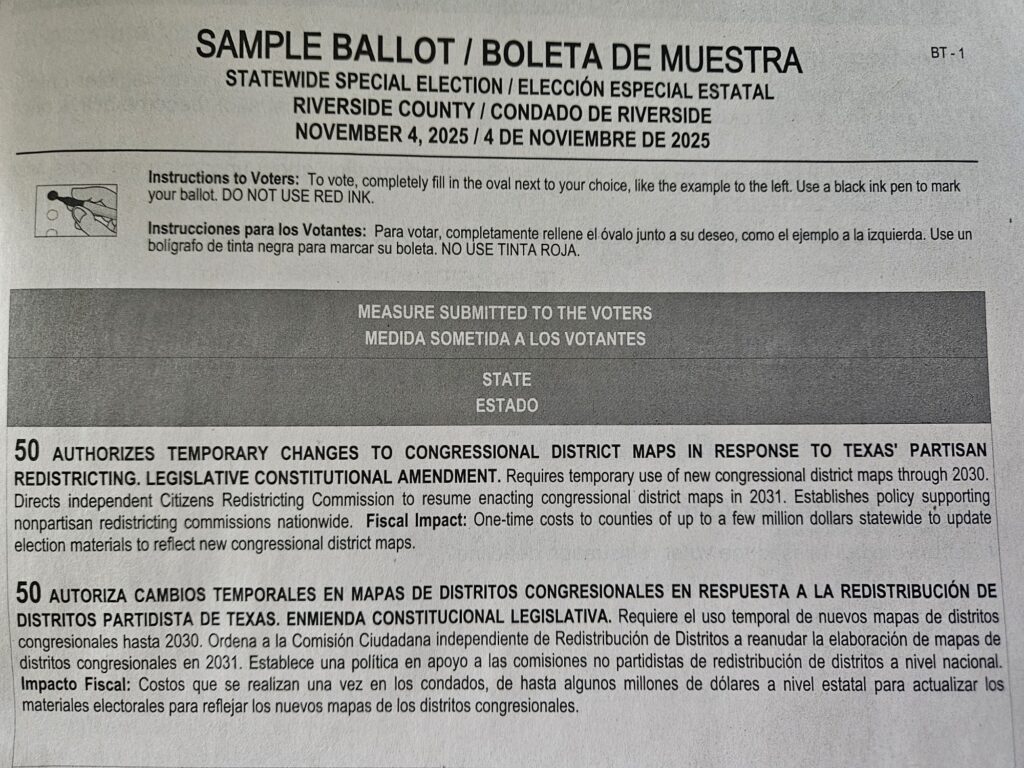
The Unvarnished Truth: California Draws a Line in the Sand
The democratic process, fragile as it often proves, is under sustained assault, and the latest skirmish finds California staring down a brazen power grab from Texas Republicans. This isn’t theoretical; it’s a cold, hard fact. Texas Republicans initiated an unprecedented power grab designed to effectively steal congressional seats and rig the 2026 election before voting even began [1]. Their audacious move has the potential to reshape the electoral landscape, not through the will of the people, but through the cynical art of partisan mapmaking.
California, rarely one to sit idly by when electoral integrity is at stake, is firing back. Proposition 50, now before California voters, isn’t just another ballot measure; it’s a direct, defiant response to this Republican scheme, a high-stakes gamble to safeguard democratic representation. This isn’t about politeness; it’s about power, and California is making it clear whose side it’s on: the voters, not the backroom operators [1].
The Texas Gambit, Deconstructed
To understand the urgency behind Prop 50, one must first grasp the sheer audacity of the Texas maneuver. Texas redrew its congressional maps with surgical precision, explicitly aiming to give Republicans an edge in an additional five districts [7]. This isn’t merely adjusting lines; it’s a calculated, partisan re-engineering of the electorate designed to cement Republican control over the U.S. House of Representatives. The intent is clear: to ensure that what one source calls Donald Trump’s agenda could pass without reflecting the true will of voters [2].
This isn’t an isolated incident, either. The architects of this scheme understand that if California doesn’t act, Texas—and potentially other Republican-led states—could tip the balance of the House in upcoming elections, granting a minority agenda outsized legislative power [2]. It’s an end-run around fair elections, a pre-emptive strike against the fundamental principle of representative democracy. The official ballot title voters will see for Prop 50 pulls no punches, specifically stating it “AUTHORIZES TEMPORARY CHANGES TO CONGRESSIONAL DISTRICT MAPS IN RESPONSE TO TEXAS’ PARTISAN REDISTRICTING” [3]. Such directness in a ballot measure title, explicitly calling out another state’s actions, is indeed a rarity [3]. This underscores the profound gravity of the situation and California’s willingness to name and shame the perpetrators of this electoral chicanery.
Prop 50: California’s Counter-Measure
So, what exactly does Prop 50 propose? At its core, a “yes” vote on Proposition 50 means California will implement new congressional maps for the 2026, 2028, and 2030 elections. Crucially, these maps will be drawn by Democratic state officials, not the state’s independent redistricting commission [2]. This is not a permanent overhaul but a temporary measure, a strategic deployment of California’s considerable political weight to counteract an external threat to fair representation [3].
The proponents argue that Prop 50 “puts the power in the hands of the People of California, not backroom politicians, to approve emergency congressional district maps in response to Trump’s election rigging scheme” [5]. They contend that without such a move, the integrity of federal elections, and thus the legislative agenda, is severely compromised. By implementing these new maps, California Democrats believe they could add up to five U.S. House seats to their column, directly offsetting the gains Texas seeks to make [4]. It’s a tit-for-tat, but one framed as a defense of a genuinely representative House.
Conversely, a “no” vote on Prop 50 would mean that California continues to use its existing congressional maps, those drawn in 2021 by the state’s independent redistricting commission, for all congressional elections through 2030. This, say Prop 50 advocates, would leave California vulnerable to the broader national impact of Texas’s gerrymander, allowing Republicans to potentially retain House control without reflecting the true will of voters [2].
The Ghost of 2008: The Independent Commission
This debate isn’t without its internal complexities for California. In 2008, California voters, weary of partisan machinations, approved a historic election reform: the creation of the independent California Citizens Redistricting Commission [1]. This commission was designed precisely to take the power of drawing district lines out of the hands of politicians and place it with a non-partisan body, ensuring fairness and preventing the very gerrymandering now at play in Texas.
Prop 50, in its attempt to fight fire with fire, temporarily bypasses this commission, allowing maps to be drawn by political officials once again [3]. This raises legitimate questions, even among those who abhor gerrymandering. As one source notes, bringing back congressional maps designed by political officials “undermines California voters who supported the creation of the independent redistricting commission in 2008” [2].
The measure’s proponents acknowledge this tension, asserting that Prop 50 still “reaffirms the power of the California Citizens Redistricting Commission to draw the lines after the next census” [1]. They present this as an emergency measure, a temporary but necessary departure from established reform to combat a more immediate and severe threat. It’s a pragmatic, if slightly uncomfortable, concession to the realities of a political landscape where one side is playing by rules the other has abandoned.
The High Stakes and the Heavy Hitters
The political weight behind Prop 50 is undeniable. The campaign is led by Governor Gavin Newsom and boasts a formidable list of endorsements, including President Barack Obama, Senator Alex Padilla, Senator Adam Schiff, and Speaker Emerita Nancy Pelosi. Beyond the political establishment, a broad coalition of advocacy groups and public sector organizations—election experts, independent redistricting commissioners, Planned Parenthood, the NAACP, California veterans, teachers, and nurses—have thrown their support behind the measure. This diverse backing underscores the widespread perception that the stakes extend far beyond mere partisan advantage; they touch the very fabric of fair representation.
The core message is stark: “If the message is simple enough — ‘Hey, stop Trump,’ or ‘Hey, protect our elections,’ — it’s likelier that they’ll end up turning out more voters” [7]. For its advocates, Prop 50 isn’t just about California; it’s a national imperative. It’s about not “just sitting back and allowing it,” but taking a stand [7]. The potential addition of up to five U.S. House seats could be the difference between a functional, representative House and one held hostage by minority rule and an agenda that demonstrably does not reflect the popular will.
A Choice for California Voters
California voters now face a pivotal choice. Do they sanction a temporary, politically drawn map to directly counter a blatant act of partisan gerrymandering from another state, or do they hold firm to the principles of independent redistricting, even if it means potentially sacrificing national electoral power to a rigged system? Prop 50 is a response to an escalating crisis, a strategic maneuver in a battle for the very soul of American democracy [6]. The decision made on Prop 50 will resonate far beyond California’s borders, sending a clear message about what constitutes acceptable conduct in the pursuit of political power. The question, then, is not just about lines on a map, but about the integrity of the ballot box itself.
Sources & Footnotes
- https://voterguide.sos.ca.gov/proposition/50/arguments-rebuttals.htm ↩
- https://boyleheightsbeat.com/proposition-50-california-new-congressional-maps-redistricting-guide/ ↩
- https://www.npr.org/2025/09/13/nx-s1-5527103/california-redistricting-ballot-measure-language-texas ↩
- https://www.theguardian.com/us-news/2025/oct/14/obama-california-prop-50-redistricting-texas ↩
- https://cadem.org/yes-on-proposition-50-faq/ ↩
- https://www.ksbw.com/article/californias-prop-50-redistricting-san-benito-county/69033067 ↩
- https://calmatters.org/politics/2025/10/proposition-50-san-joaquin-valley/ ↩

Leave a Reply